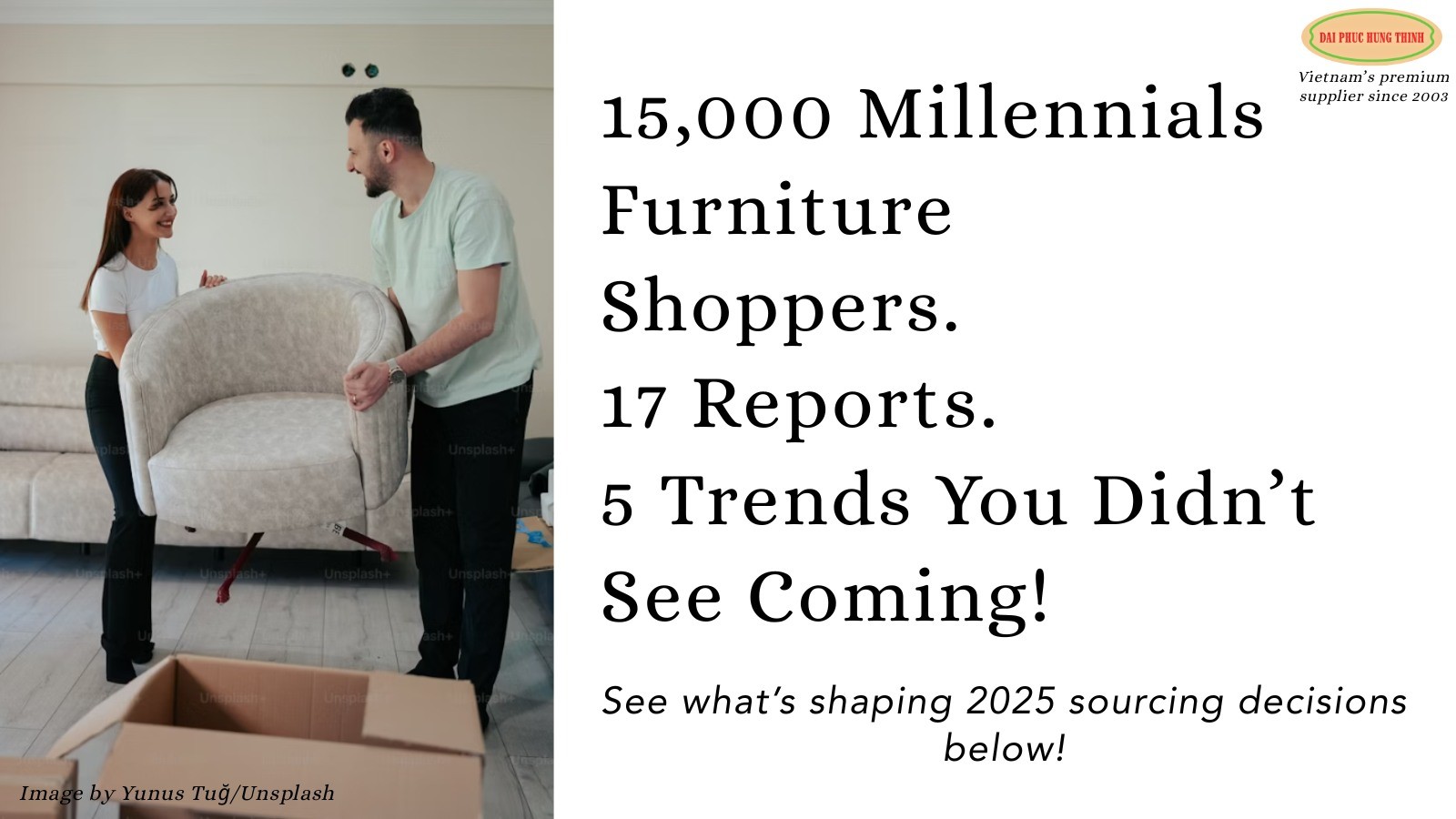Millennials (aged 28 to 43)—now the largest group of homebuyers and renters—are reshaping furniture trends. If you're sourcing for 2026, this is what you need to know.
We reviewed 17 latest furniture market studies, reports, and consumer behavior surveys, collectively reflecting the preferences of over 15,000 Millennial furniture shoppers across Europe and North America.
Below are 5 surprising insights that furniture professionals, especially buyers and retailers, need to know before sourcing for the next season ⤵️
Reading time: Just 2 minutes 15 seconds!
1. Millennials Are Willing to Spend, But Only for “Room Anchors”
Forget the myth that Millennials want everything cheap and fast. While price sensitivity exists, the data shows they’re happy to splurge, just not across the board. Instead, they focus on what they call “anchor pieces” (sometimes referred to as "statement pieces"): the large, statement items that visually define a space (like a colorful dining table or outdoor lounge set).
But why?
What’s driving this behavior is a shift in how Millennials view their home—not just as a place to live, but as an extension of personal identity. In a sea of fast, disposable decor options, they use anchor pieces to say, “this is who I am.” Once they’ve decided something is core to their space, they’ll go above budget—especially for pieces that feel permanent, meaningful, and expressive.
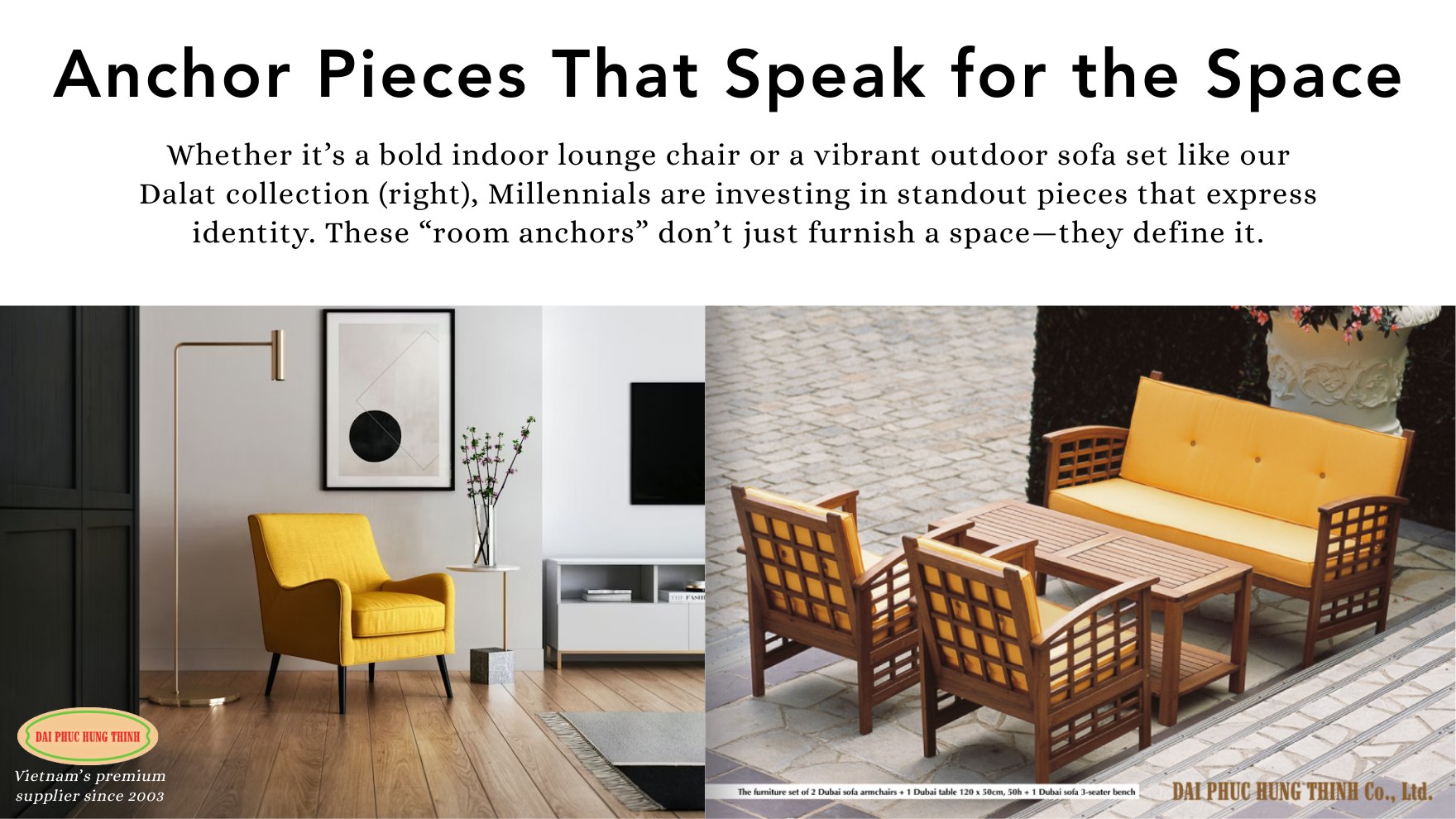
For retailers and buyers, this means rethinking how you merchandise and position your assortment. Instead of leading with variety or price, highlight a small number of hero pieces that embody quality, craftsmanship, and character.
Invest in storytelling around those items. Example: for your outdoor furniture line, where the wood comes from, how it’s built, why it lasts. Millennials aren’t just browsing for products—they’re curating their spaces. And they’re looking for that one centerpiece that feels worthy of being at the heart of it.
2. “Moveable, Modular, and Multi-Use” Isn’t Just for Indoors Anymore
Millennials, especially urban ones, are embracing outdoor spaces in a completely new way. They want furniture that’s flexible, reconfigurable, and stylish enough to match their personal aesthetic.
Modular lounge sets that can be rearranged for hosting or relaxing are gaining traction, and so are folding, functional tables and chairs made of durable yet beautiful woods like eucalyptus. And the modular trend isn’t just about flexibility—it’s about control. Millennials want to feel in charge of their spaces, whether it’s a 45-square-meter balcony or a suburban patio.
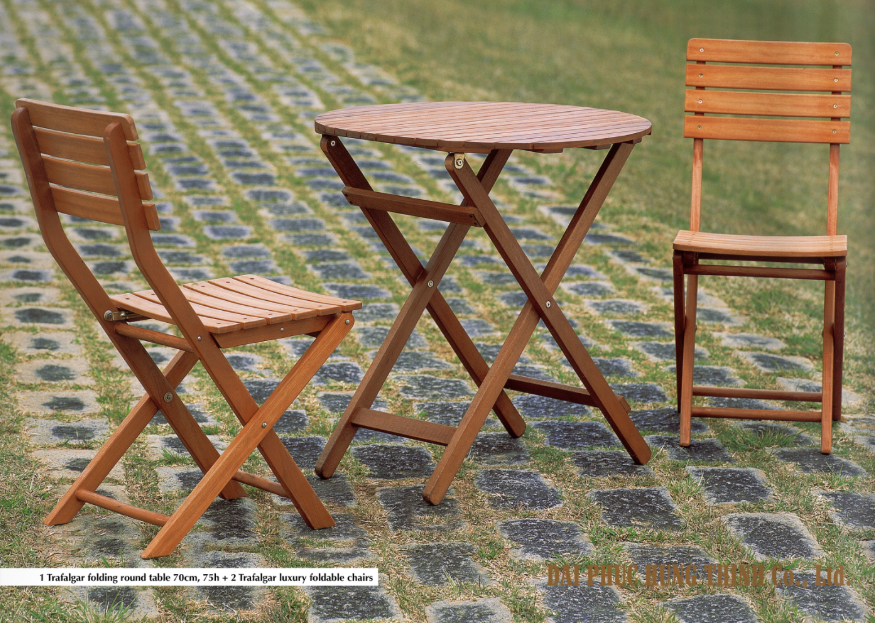 The Trafalgar coffee set—crafted from 100% FSC-certified acacia by Dai Phuc Hung Thinh Furniture. A long-time bestseller among our clients, this foldable table and chair set is now featured in homes across Germany, Poland, and other key European markets.
The Trafalgar coffee set—crafted from 100% FSC-certified acacia by Dai Phuc Hung Thinh Furniture. A long-time bestseller among our clients, this foldable table and chair set is now featured in homes across Germany, Poland, and other key European markets.
This is your sign to double down on functionality and flexibility. Millennial shoppers are drawn to furniture that adapts to their lives, so highlight pieces like foldable chairs, extendable tables, and anything that can shift with the seasons or space constraints.
Think beyond aesthetics: show how your products can transform, stack, or move with ease. Even your merchandising should reflect that adaptability—because when buyers can picture multiple uses, they’re far more likely to commit.
3. Natural Tones Beat Statement Colors
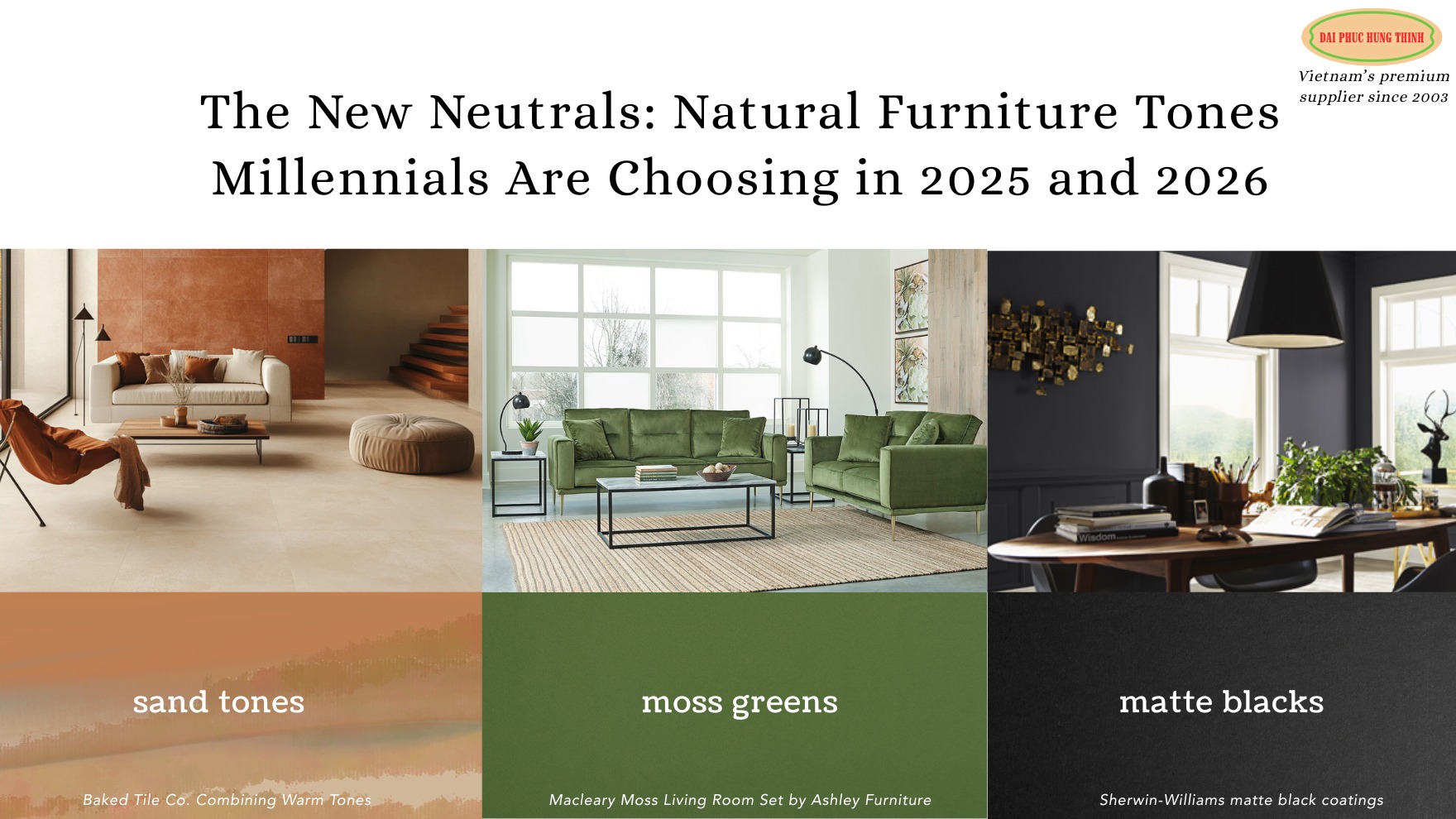
Despite the vibrant personality often associated with Millennials, their furniture choices are trending muted. Think oiled wood finishes, sand tones, moss greens, and matte blacks.
Consumers overwhelmingly associate natural wood tones with quality and timelessness. So instead of pushing bright powder-coated aluminum, retailers are leaning into earthy finishes—particularly in outdoor categories where the wood itself is the hero.
This trend speaks to a larger design philosophy: subtle luxury. Instead of screaming for attention, Millennials want their homes—and gardens—to whisper taste and intentionality. Acacia and eucalyptus, with their natural grains and warm undertones, offer the kind of quiet sophistication that feels personal and curated, not mass-produced. If you can deliver that experience in a way that also feels eco-conscious, you’re speaking their language.
4. Assembly Experience = Brand Perception
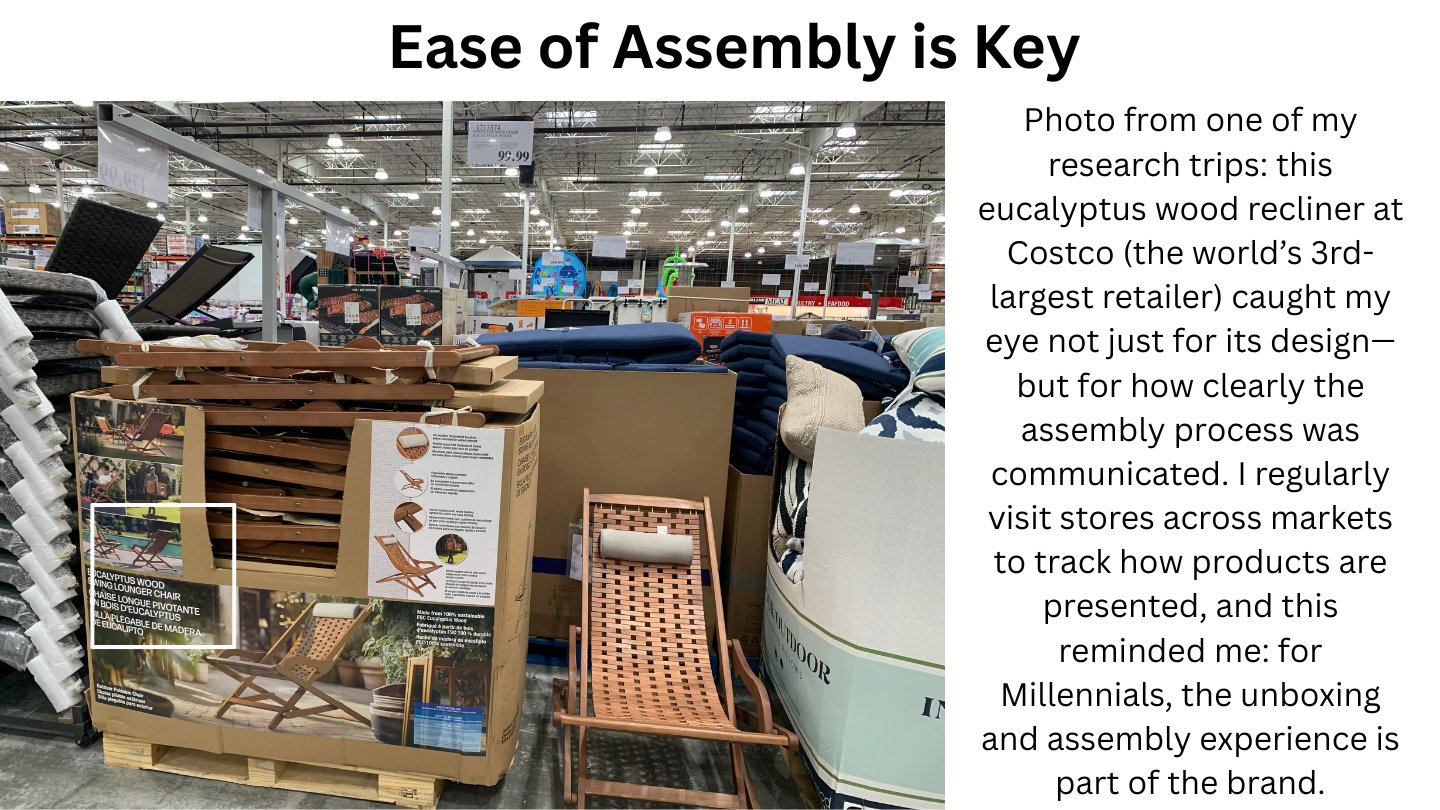
Millennials are quick to judge a product not just by how it looks—but by how it comes together. The research shows that furniture assembly experience directly impacts brand trust and repurchase behavior.
For this generation, a poor assembly experience (confusing instructions, bad screws, wobbly parts) isn’t just frustrating—it feels like a betrayal of brand values.
Surprisingly, even well-designed pieces can get negative reviews purely due to difficult setup. Many Millennials equate a smooth assembly with overall quality and craftsmanship.
Retailers and buyers sourcing for this audience should prioritize products with minimal-tool assembly or clear, intuitive packaging. And for wooden outdoor furniture, where durability is expected, pre-assembled or quick-lock joinery can feel like a mark of premium build quality.
5. Textured Surfaces Are Outselling Gloss in Key Millennial Demographics
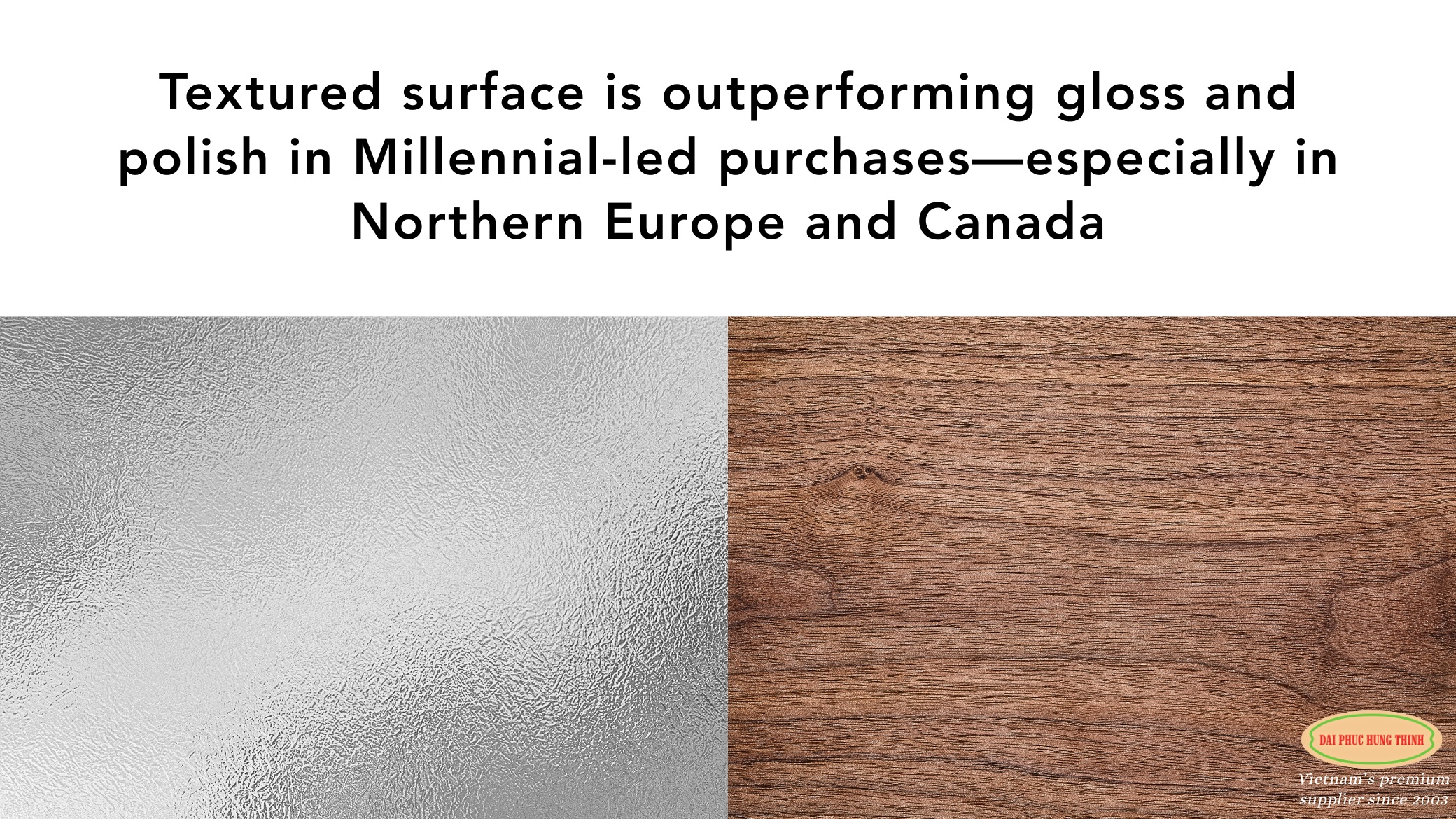
In a surprising twist, textured surface is outperforming gloss and polish in Millennial-led purchases—especially in Northern Europe and Canada. Outdoor and indoor furniture with tactile finishes—grooved wood, visible knots, or brushed grain—conveys authenticity and craftsmanship.
This is especially relevant in wooden garden furniture, where oiled or brushed finishes create a “natural feel” and reduce visual fingerprinting and shine.
Sourcing decisions that prioritize wood with light surface texture (versus high-gloss sealants) are proving more successful in key markets.
if texture is trending, your product line should reflect it. Prioritize finishes that highlight natural grain, subtle imperfections, or soft-matte treatments. When selecting samples or developing new SKUs, think beyond color—run your hand over the surface. If it feels real, grounded, and artisanal, it’s likely what Millennial buyers want next.
Thanks for reading to the end! This generation isn’t just reshaping how we live indoors—they’re transforming how we think about all living spaces, including the garden. If you’re looking to refresh your product mix for 2025, especially targeting younger consumers, these insights should guide what you source next.
About Us
At Dai Phuc Hung Thinh Furniture, we share these insights not just as a supplier, but as a partner invested in the long game of furniture.
As a family business founded in 2003, we’re able to work closely with clients, share hard-earned insights, and offer the kind of personal service that only comes when you treat people like family.
Whether you work with us or not, we believe in sharing insights that help move the industry forward—because in a noisy market, clarity is what really matters.
Since 2003, we’ve specialized in 100% FSC®-certified outdoor furniture using sustainably sourced acacia and eucalyptus. Our past and present clients include JYSK, Segmüller, and other respected retailers across Europe.
If you’d like to diversify your supply chain, secure competitive pricing, and tap into Vietnam’s fast-growing market, we’d love to help. Feel free to contact us at sales@daiphuchungthinh.com.vn to discuss your needs.


